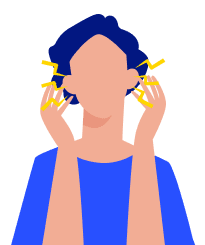






A detailed history followed by thorough Vestibular Evaluation and Audiometry will help the doctor reach the diagnosis and stage of disease. According to the test results, the treatment is planned.

The treatment for Meniere’s disease focuses on relieving the symptoms of the disease, reducing inner ear pressure and preventing disease progression.
This would be achieved through various measures –
The primary goal of meniere’s disease treatment is not to cure the condition, but to reduce the frequency and severity of vertigo attacks, preserve hearing for as long as possible, and improve overall quality of life.
Because Ménière’s disease is chronic and progressive, treatment for meniere’s disease is usually long-term and multi-modal, tailored to the stage and severity of symptoms.
Treatment of meniere’s disease typically follows a step-wise approach:
This structured approach ensures that meniere disease treatment is effective while avoiding unnecessary invasive procedures.
No single treatment works for all patients with Ménière’s disease.
This is because:
Combining dietary changes, medication, vestibular rehabilitation, and targeted procedures provides the most consistent symptom control. This integrated approach is now considered the standard for treatment of meniere’s disease worldwide.
While vestibular rehabilitation cannot stop fluid buildup, it plays a crucial role in improving balance and reducing motion sensitivity between vertigo episodes.
Vestibular rehabilitation is especially helpful for:
This makes it an essential supportive therapy in comprehensive meniere’s disease treatment.
Successful treatment for meniere’s disease is measured by:
Early diagnosis and adherence to treatment significantly improve long-term outcomes.
Addressing these misconceptions helps patients make informed decisions.
You should consult a specialist urgently if:
Escalation of treatment for meniere’s disease at the right time prevents unnecessary disability.
Meniere’s disease treatment is most effective when started early, personalised carefully, and adjusted over time.
With the right combination of lifestyle changes, medication, rehabilitation, and advanced therapies when needed, most patients can achieve good long-term symptom control.
Treatment of Méniere disease is aimed at controlling the symptoms and lessening the number of attacks. These can be treated with diet changes, medications to control vertigo and nausea, and balance-enhancing therapy. In more chronic instances, a more complex set of testing the vestibular motions and rehabilitation, like Neuroequillibrium, is used to detect inner ear abnormality and recommend a specific course of treatment.
Individuals affected with Méniere’s disease are typically advised to shun consuming foods that may aggravate the level of fluid imbalance in the inner ear. These usually consist of high salt content foods, caffeine, alcohol and highly processed food. Sugar consumption and eating foods without food additives such as MSG should also help. Balance and consistency of the diet may be important in the management of symptoms.
Normal life with MENIERes disease entails the ability to treat and avoid triggers. Typically, many individuals have habits that they exercise on a daily basis, including keeping to dietary guidelines, stress management, proper rest, and treatment plans. Knowledge of warning signs and pacing activities can also be used to avoid extreme episodes and enable people to remain active, independent and productive in the long term.
High salt intake, stress, sleeplessness, caffeine, alcohol, dehydration, and abrupt increase or decrease in pressure are common triggers of Meniere’s disease. Others observe the flare-ups when they are sick or going through hormonal fluctuation. Individuals respond differently to trigger factors and therefore monitoring of symptoms and lifestyle may aid in determining individual patterns of responding to these factors and enhance long term management of symptoms.
Méniere disease is not said to be curable although it can be managed through the right care. With an appropriate combination of lifestyle change and medication, many of them find that the number and severity of attacks generally decrease over time. Neuroequillibrium centers specialize in long-term management techniques which assist the patient to gain balance, lessen the vertigo incidences and enhance the quality of life.
Corporate Office:
140, Shrigopal Nagar, Gopalpura Bypass Road, Jaipur 302018, Rajasthan, India
Manufacturing Site:
1st Floor, Plot No.3, Pooja Tower, Muktanand Nagar, Gopal pura Mode, Jaipur, Rajasthan 302018
All rights reserved © 2026 NeuroEquilibrium Diagnostic Systems Pvt Ltd.
Vertigo Clinic in Ujjain | Vertigo Clinic in Barwani | Vertigo Clinic in Patna | Vertigo Clinic in Miraj | Vertigo Clinic in Kolhapur | Vertigo Clinic in Nashik | Vertigo Clinic in Jaysingpur | Vertigo Clinic in Amravati | Vertigo Clinic in Solapur | Vertigo Clinic in Pune | Vertigo Clinic in Aurangabad | Vertigo Clinic in Nagpur | Vertigo Clinic in Sagar | Vertigo Clinic in Indore | Vertigo Clinic in Jabalpur | Vertigo Clinic in Bhopal | Vertigo Clinic in Bilaspur | Vertigo Clinic in Ahmedabad | Vertigo Clinic in Vadodara | Vertigo Clinic in Surat | Vertigo Clinic in Navi Mumbai | Vertigo Clinic in Thane | Vertigo Clinic in Mumbai | Vertigo Clinic in Palghar | Vertigo Clinic in Jaipur | Vertigo Clinic in Sriganganagar | Vertigo Clinic in Alwar | Vertigo Clinic in Kota | Vertigo Clinic in Udaipur | Vertigo Clinic in Lucknow | Vertigo Clinic in Prayagraj | Vertigo Clinic in Varanasi | Vertigo Clinic in Gurgaon | Vertigo Clinic in Dehradun | Vertigo Clinic in Rohtak | Vertigo Clinic in Amritsar | Vertigo Clinic in Ludhiana | Vertigo Clinic in Greater Noida | Vertigo Clinic in Delhi | Vertigo Clinic in Kannur | Vertigo Clinic in Trichur | Vertigo Clinic in Cochin | Vertigo Clinic in Coimbatore | Vertigo Clinic in Tiruppur | Vertigo Clinic in Chennai | Vertigo Clinic in Hosur | Vertigo Clinic in Bangalore | Vertigo Clinic in Mangalore | Vertigo Clinic in Hyderabad | Vertigo Clinic in Sangli